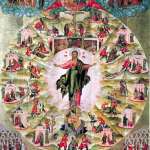Not to pile on poor Miss Rand, but the responses here and on Facebook to Ayn Rand’s Fiction and especially Ayn Rand the Child, my attempt at sympathy for her, have got me to reflecting on her appeal and effect. So:
The title, as many readers will know, refers to Whitaker Chambers’ famous review of Ayn Rand’s Atlas Shrugged, published in National Review at the end of 1957. The publication of “Big Sister Is Watching You” was one of the magazine’s finest moments. Here is the paragraph (subdivided) in which the gas chamber line occurs.
Something of this implication is fixed in the book’s dictatorial tone, which is much its most striking feature. Out of a lifetime of reading, I can recall no other book in which a tone of overriding arrogance was so implacably sustained. Its shrillness is without reprieve. Its dogmatism is without appeal.
In addition, the mind which finds this tone natural to it shares other characteristics of its type. 1) It consistently mistakes raw force for strength, and the rawer the force, the more reverent the posture of the mind before it. 2) It supposes itself to be the bringer of a final revelation. Therefore, resistance to the Message cannot be tolerated because disagreement can never be merely honest, prudent, or just humanly fallible. Dissent from revelation so final (because, the author would say, so reasonable) can only be willfully wicked. There are ways of dealing with such wickedness, and, in fact, right reason itself enjoins them.
From almost any page of Atlas Shrugged, a voice can be heard, from painful necessity, commanding: “To a gas chamber — go!” The same inflexibly self-righteous stance results, too (in the total absence of any saving humor), in odd extravagances of inflection and gesture — that Dollar Sign, for example. At first, we try to tell ourselves that these are just lapses, that this mind has, somehow, mislaid the discriminating knack that most of us pray will warn us in time of the difference between what is effective and firm, and what is wildly grotesque and excessive.
Soon we suspect something worse. We suspect that this mind finds, precisely in extravagance, some exalting merit; feels a surging release of power and passion precisely in smashing up the house. A tornado might feel this way, or Carrie Nation.
Chambers also explains why Rand’s ideals lead to dictatorship, among other insights in the review. “Big Sister” is said to have banished Rand from the new conservative movement, though some conservatives, apparently bedazzled or befuddled by her defense of capitalism, defended her. See George Nash’s description in The Conservative Intellectual Movement in America Since 1945 for the story. After this controversy, he writes, Rand “remained for most conservatives merely the leader of a sect.”















